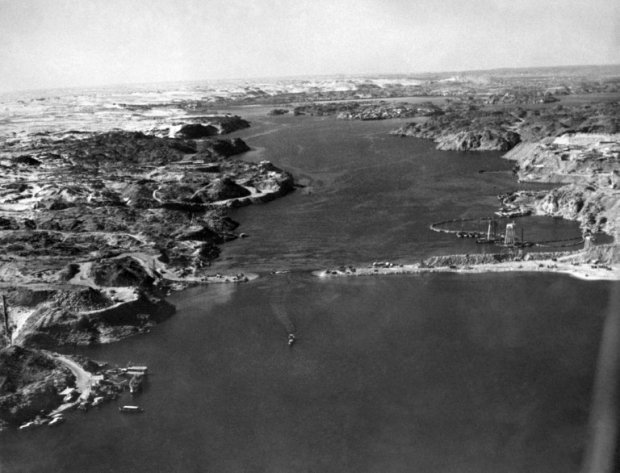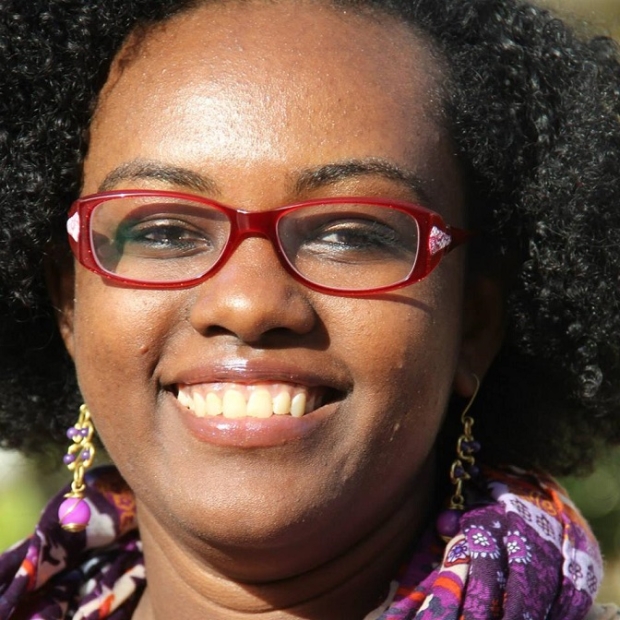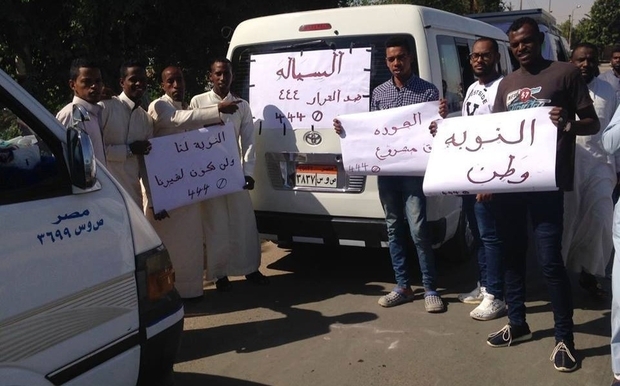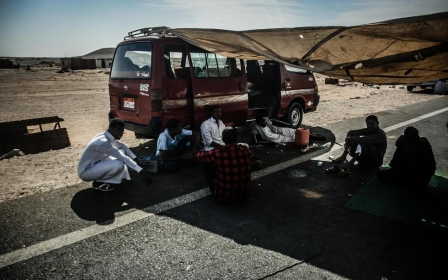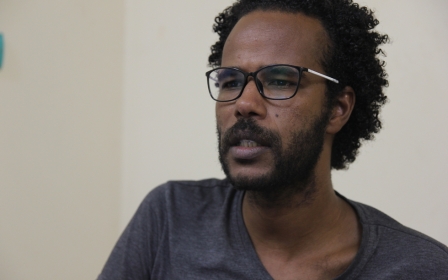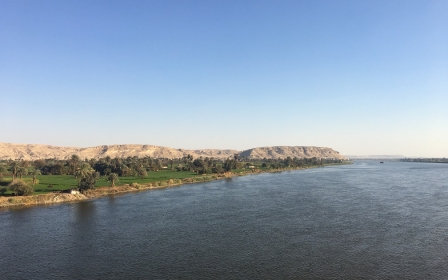'Cairo is killing us': Young Nubians dream of return to ancestral lands

It was only a day before the overthrow of Egypt’s strongman president Hosni Mubarak, on 11 February 2011, that Nubian activist Fatma Emam witnessed a scene that will forever resemble a country she had always dreamed about.
Emam was standing in Egypt’s Tahrir Square, when a group of people who were marching appeared, having come out of a side road. Tens of Nubians were chanting in their native Nubian tongue: "Daffi, daffi, wow Mubarak” or "Leave, leave Mubarak".
'This is the Egypt we want, an Egypt that includes all'
Nuba, located in the south of Egypt and close to the Sudan border, was one of the earliest kingdoms in Africa. Enjoying a unique cultural heritage, Nubians have for a long time struggled to preserve what is left of their ancient civilisation.
Four waves of displacement
Nubians were subject to a series of displacements over the last century, witnessing four stages that took place between 1902 and 1963. The first of these was caused by the flooding of the Nile in 1902 which wiped out dozens of Nubian villages; a similar inundation came in 1912 destroying eight more villages, and another ten were annihilated when the Nile burst its banks again in 1933.
Emam explained that during the first three tragedies, Nubians woke up to the Nile waters washing away their homes.
“Nubians were left to their own destiny,” said Emam.
Rather than a natural catastrophe, the fourth displacement was the man-made disaster for Nubians, who still today painfully recall being forcibly evicted from their villages to allow for the construction of the High Dam in 1963. They were all relocated to the nearby agricultural town of Kom Ombo, 50km north of Aswan.
Emam, who is 35, was not yet born when the displacements took place, but she can describe every little detail of the painful journey, as if she had witnessed it with her own eyes.
This is also true for thousands of Nubian youth, who never witnessed the displacements but are strongly connected to their people's history.
Emam was raised by a family that made her memorise every detail of her culture and history, despite being brought up in Cairo and her inability to even speak the Nubian language,
“We listen to the songs of displacement at our weddings, we sing Abayasa and Nuba Mally Salam. We were displaced on a promise to return to this land, and we will never forget this promise,” she said.
The song Abayasa, meaning "I wonder," is a very sad lament that Nubians sang during their journey of forced displacement in 1963.
The song's lyrics are:
“I wonder if we will be able to continue as if nothing has happened.
Oh Nuba, the homeland of all, and our biggest love, your place is in the heart.
No, no a thousand times, Oh God, save us from this ordeal.”
In addition to being torn away from their ancestral land, Nubians were relocated to places away from the Nile, which is very central to Nubian culture.
As Emam explains, the Nile represents everything to Nubians.
“We baptise newborns in the Nile. The first marriage ritual is to have the newlyweds swim in the Nile. Fish is a major component in our food, and agriculture is our major economic activity,” she said. “Can you imagine how painful it is when you take the Nile away from us?”
'Can you imagine how painful it is when you take the Nile away from us?'
For Nubian activist Moustafa el-Shourbagy, a member of Komma, a local initiative aimed at changing stereotypes about Nubian culture, his connection to the land was a very spontaneous process.
“I listened to my grandparents who never spoke Arabic, and I always wondered, why do they speak a different language? Why do I have a different skin colour?”
Such questions were the drive for Shourbagy to dig further into the roots of his history and culture, and his search was always driven by passion.
“When we knew about our history and culture, we started to ask new questions, like how we can preserve this culture? How can we go back to our lands?” he said. “This fear for our heritage is where we realised that the return to our land is essential, it is not a matter of luxury.”
A march to ancestral land
In November 2016, hundreds of Nubian activists marched towards their ancestral lands in Aswan, protesting a number of government decrees that would hinder their right to return to their land, a right that was protected by the Egyptian Constitution in 2014.
But a series of presidential decrees have hindered these dreams. Decree 444, issued in 2014, designated Egypt’s border areas as military zones, which included an important part of Nuba’s ancestral land. Another decree, issued in 2016, also confiscated another part of the land in order to revive a controversial Hosni Mubarak-era irrigation mega-project, the Toshka project.
The protests did not go unnoticed, as they pressured Egyptian authorities to negotiate with a delegation of Nubian activists to settle the dispute.
In a monthly youth conference held at Aswan during the weekend, Sisi cancelled his last decision to confiscate part of the Nubian ancestral lands for the Toshka development project.
He also announced more development projects and improvements in the infrastructure in Nasr al-Nouba, a city close to Kom Ombo where Nubians are currently located.
"Nubians are only 150 thousand or 200 thousand, do you think that all of us Egyptians won't be able to make you satisfied? We would cut from our bodies to give to you," Sisi said.
Although Nubian activists agreed that it was a good step, many said that it is still not enough, as the rest of their ancestral land remains confiscated by the government, and decree 444 designating Egypt's borders as military zones remains in place.
There are no official figures regarding the number of Nubians living in Egypt, but Nubian activists believe there are a few million out of the country’s 90 million population, which is much more than the figures announced by Sisi.
Racism and discrimination
Young Nubians are not just attached to their cause through their families and culture, but the constant discrimination they face on a daily basis makes them more connected to their identity.
“In any airport, I always expect some sort of racial profiling, and it is becoming completely inhumane. It is painful,” Emam said. “I would always hear comments like: who is this crow passing by? Were you burned in the oven? What is this black morning?”
She added that she also gets many sexual comments, as “black women” are believed to be more entertaining in bed, according to Emam.
This hostility and discrimination makes her yearn to return to her homeland even more.
“Cairo is killing us. It is called Cairo [which means the oppressor in Arabic] because it oppresses people. Not only us, but it oppresses Upper Egyptians, those who come from the Delta, those in Sinai,” she said.
'Cairo is killing us. It is called Cairo [which means the oppressor in Arabic] because it oppresses people'
Shourbagy, on the other hand, believes that discrimination happens unconsciously.
“They do not know that there are fellow Egyptians who are ethnically and culturally different. TV never airs our songs, we never see our skin colour on TV. There is total ignorance surrounding us,” he said.
'TV never airs our songs, we never see our skin colour on TV. There is total ignorance surrounding us'
What Nubian youth did during the 25 January revolution was speak out about the Nubian cause.
Through the use of social media, Nubian youth started to address the Nubian issue as a matter of concern to all Egyptians, not only Nubians, according to Emam. While campaigning for their latest protests, Nubian activists used the hashtag “The Nubian Return Convoy” to raise awareness about their cause, which went viral and trended for the entire period of the protest in November.
A Nubian Twitter user shared a photo of a colourful Nubian house in Kom Ombo where Nubians currently live and said: "These are the walls and doors of the houses that speak of cheerfulness - imagine its people in the midst of their displacement ordeal and still willing to be happy."
For Emam, the use of social media and reaching out to the Egyptian people was a major win.
“Before this, we were living in a ghetto. What we did was to break this ghetto and get out of it,” she said.
This article is available in French on Middle East Eye French edition.
New MEE newsletter: Jerusalem Dispatch
Sign up to get the latest insights and analysis on Israel-Palestine, alongside Turkey Unpacked and other MEE newsletters
Middle East Eye delivers independent and unrivalled coverage and analysis of the Middle East, North Africa and beyond. To learn more about republishing this content and the associated fees, please fill out this form. More about MEE can be found here.



